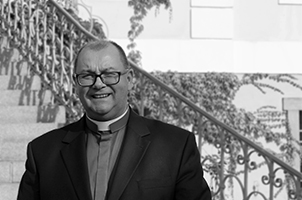
We have become participants and witnesses of an extraordinary experience. The global epidemic not only stopped us on the run and excluded from our daily activities, but also forced us to reflect and perhaps redefine our priorities.
It's understandable that we are afraid, especially of losing our health and work. The virus of fear is spreading faster than the coronavirus, fuelled by successive media news and uncertainty, which does not allow us to determine anything in the long term. We do not know how long the epidemic will last, it is hard to even imagine its effects. Thinking about them, it causes fear, sometimes anger and even aggression. All the more so, we should be sensitive to such states, we should notice them and stop them before they gain momentum. The worst is uncertainty - how long will it take?
Forced isolation encourages the escalation of bad emotions and fears; I recently spoke at the service about the walls, now more and more symbolic "four walls", which come closer to us every day, limiting our sense of freedom and choice. However, being locked in a house does not mean being closed to others. I have been observing trustingly how wonderful initiatives have been multiplying since the announcement of the epidemic: tens of thousands of Poles are already active in the "Visible Hand" (“Widzialna Ręka”) aid campaign, in the "We Call for Meals" (“Wzywamy posiłki”) campaign, which provides meals to medical staff, in which numerous restaurants and food producers take part pro bono; specialists from the group "Psychologists for Society" offer free therapy for those in need, Wroclaw companies share their knowledge...
I have the impression that the more restrictions exist, the more opportunities and enthusiasm appear. It is as if this difficult time is waiting for us to unleash a huge amount of goodness and willingness to cooperate. This involvement can be the perfect cure for our fears. Each of us can do something for another person, according to our own abilities. Someone will volunteer, someone will do the neighbour’s shopping or take the dog out, someone else will sew a mask for the hospital. We can help with a deed, a word, a warm thought, we can call someone who IS or feels lonely to reassure them.
The walls, the symbolic "four walls", should not restrict us or mean closure. On the contrary, by giving a sense of security and self-esteem, they should make us sensitive to the world, to other people. The four walls should be a haven from which we can sail out at any time to help others - the searching, the waiting, the lonely, the sick, the uncertain, the frightened.
The walls that limit us, that push on us, are built in our heads! Let us not allow them to close the way to another person.
Some people mention the atomization of society, the loosening or even disintegration of social ties resulting from our excessive individualism, not to say egocentrism. The current forced alienation has shown that we are not a collection of independent atoms. On the contrary, the pandemic made us realize, sometimes very painfully, how dependent we are on each other. We all exist in a network of social and economic connections.
So it is worth to switch from the egotistical, neurotic "I" to the "we" solidarity mode. Cooperation, help, mutual kindness, care for others are now the key concepts, these are our signposts. It is said that the culture of trust is the foundation of civil society - we now have a chance to show how mature and responsible we are. It is only up to us how we will do this lesson.
Let us also remember how often we said that we lacked time - for ourselves, for family, for friends. Let us treat the current period as a gift, as a time given. To be open to others: to talk to your loved ones, to notice small things. To be not only task-based, but also more present. It is worth renewing simple questions: What is really important to me? What can I give up? If I had one year to live, how would I live it? Let's stop to listen to these real needs, so far jammed up by the daily routine. Let's treat the present period as a gift - we are to experience it and live it, because it is time given to us.
Bishop Waldemar Pytel - Member of the Council of the Krzyżowa Foundation for Mutual Understanding in Europe



